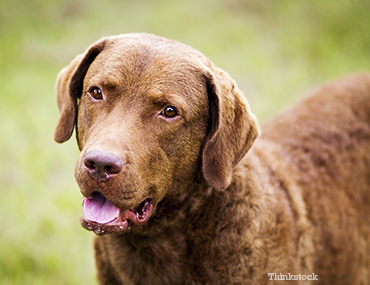Background:
In 1807 a ship named Canton wrecked off the coast of Maryland. The ship carried its crew along with two lesser Newfoundland pups named “Sailor,” and “Canton.” The crew was so grateful that they gifted these pups to the people of Maryland. They were then bred with local retrievers to create the breed known today as the Chesapeake Bay retriever.
The Chesapeake Bay quickly gained a reputation as a water dog. He was able to remember where each duck had fallen and retrieved hundreds per day from the icy and choppy waters of the Chesapeake. He was also one of the first dogs recognized by the American Kennel Club in 1878. In spite of this the Chesapeake has gained only a moderate popularity.
Sizing up:
- Weight: 55 to 80 lbs
- Height: 21 to 26 inches
- Coat: Short double
- Color: Any shade of brown, sedge, or deadgrass
- Life expectancy: 10 to 13 years
What’s the Chesapeake Bay retriever like?
The Chesapeake has a reputation for being a willful and stubborn dog, but of course this is simply a misunderstanding. Admittedly the Chesapeake is an individual, and capable of making his own decisions but in reality he’s not stubborn. The reputation originated when pet owners tried to physically discipline their Chesapeakes and found that they didn’t respond well. A much better approach, than physical discipline, is ample play time both before and after a training session. The Chesapeake Bay is sensitive and needs to hear a firm but encouraging voice. He’s also intelligent and mixing work with play will keep him interested in you for the duration of his training.
The Chesapeake is happy and polite. Most aren’t problem barkers but some will be vocal when they’re happy. He might also smile at you, don’t mistake bared teeth for aggression.
The Chesapeake has excellent eyesight and will certainly be a capable hunting companion. He can also compete in agility, sporting or even show competitions.
The Chesapeake has a short double coat but that will require frequent brushing.
Health:
There are several hereditary diseases to watch for in this breed:
- Type 3 Von Willebrand disease
- Cataracts
- Regional Alopecia
- Hip dysplasia
- Progressive retinal atrophy
Takeaway points:
- The Chesapeake is a good family dog
- The Chesapeake is surprisingly calm but requires daily play time
- The Chesapeake has amazing stamina
If you have any questions or concerns, you should always visit or call your veterinarian – they are your best resource to ensure the health and well-being of your pets.
